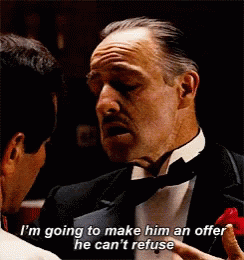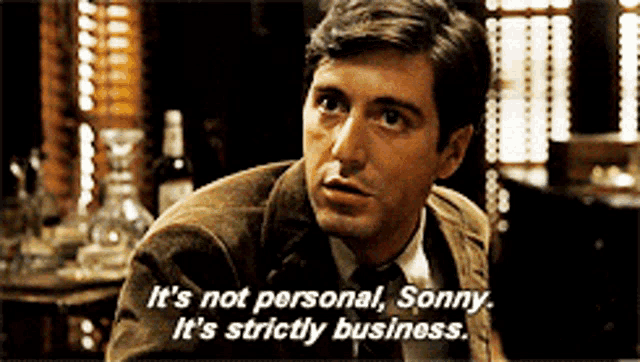The Cardfather: How Fanatics Consolidated Power and Killed a Hobby
It’s no secret that major sports leagues and their favored companies abuse their monopoly power to the detriment of fans. Whether it’s ticket fees, streaming blackouts, or now, trading cards, the pattern repeats: competition vanishes, prices rise, and fans get squeezed.
While usually we talk about Disney or Ticketmaster controlling their respective turfs. Today, we look at the trading card racket, dominated by Fanatics. A recent antitrust class action, Jones v. Fanatics, alleges that Fanatics, the sports merchandise giant, has orchestrated a hostile takeover of the entire trading card ecosystem. According to the complaint, the company didn’t win the market through innovation. Rather they bullied, extorted, and bought off their competition. Now, collectors are paying the price.
For decades, competition defined the card market. Companies like Topps and Panini vied for licenses, which kept prices stable and quality high. But that era ended when Fanatics executed what the complaint describes as a coordinated licensing scheme that monopolized every major sport. Now the industry looks like a bad mafia movie, except Fanatics CEO, Michael Rubin, lacks the charisma of Al Pacino or James Gandolfini.
“I’m going to make him an offer he can’t refuse.”
Fanatics acquired long-term, exclusive licensing agreements with MLB, the NBA, the NFL, and all of their respective players’ unions—six deals in total. According to the lawsuit, these contracts weren’t subject to any competitive bidding. Instead, Fanatics secured them by offering leagues and unions equity stakes in the future profits of a monopoly it was engineering.
“Fanatics obtained long-term exclusive licenses—at least 10 years, and in most cases, 20 years—by promising sports leagues and players associations an equity stake in its future monopoly profits... eliminating competitors and securing monopoly power. These were ‘back room’ deals.” (¶6)
But exclusive licenses weren’t enough. The complaint alleges that Fanatics bought Topps, then acquired the main card printer used by its last major rival—Panini. With control over the printing supply chain, Fanatics could allegedly sabotage its competitor at the source.
“Fanatics’ control over Panini’s lifeblood was the purpose of its acquiring control of GCP. After acquiring this control, Fanatics’ CEO, Michael Rubin, told Panini’s CEO, Mark Warsop, that Fanatics could now turn off the GCP machines devoted to Panini whenever it wanted, and from time-to-time Fanatics has done just that.” (¶121)
"It's not personal, Sonny. It's strictly business."
Fanatics’ tactics weren’t limited to licenses or equipment. The complaint describes aggressive moves against Panini’s workforce. They allegedly threatened, deceived, and intimidated key employees to poach them. When that failed, Fanatics reportedly threatened to blacklist workers if they didn’t join.
“At times, Fanatics went even further, telling Panini’s employees that Fanatics would soon take over Panini’s business before Panini’s licenses expired and thus Panini—and with it these employees’ jobs—would no longer exist. So, if these employees wished to continue in the industry, Fanatics’ story went, they needed to join Fanatics immediately.” (¶131)
Fanatics also allegedly pressured star rookies not to sign autograph deals with Panini even when Panini still held the official license. Why? To strangle Panini’s access to rookie cards, which often hold the most long-term value in the hobby.
“The lawyer with the briefcase can steal more money than the man with the gun.”
Controlling supply chains and extorting workers still wasn’t enough for the Fanatics mob. They sought out to make sure that collectors paid the price for these expensive exclusive contracts by fixing resale prices. In contracts with local trading card ships, Fanatics created anticompetitive terms to allow them to “unilaterally set minimum prices” for cards at any time. If a small local business owner decided to ignore these “suggestions” Fanatics would suspend or terminate the relationship.
“Fanatics sent contracts to local trading card shops requiring them to acknowledge that whenever Fanatics wished, it could unilaterally issue minimum prices available to consumers to pay for Fanatics trading cards. Although Fanatics labeled these unilaterally controlled, minimum price requirements as “suggestions,” Fanatics made clear that if local trading card shops ignored these price floors, that would be grounds for Fanatics suspending their accounts.” (¶147)
If this sounds familiar, it's because the NFL tried to do this with tickets years ago before former New York Attorney General Schneiderman and then-Florida Attorney General Pam Bondi launched an investigation into the NFL for potential antitrust violations related to its NFL Ticket Exchange. The investigation revealed that the NFL's implementation of price floors, which set a minimum value for ticket resales, artificially inflated ticket prices. The League quickly settled and stopped enforcing the price floors.
"Only don't tell me you're innocent because it insults my intelligence and makes me very angry."
While Jones v. Fanatics centers on trading cards; the behavior it describes echoes a pattern SFC has exposed in other industries, like Live Nation–Ticketmaster or Disney.
In both instances, a vertically integrated giant, armed with exclusive contracts and immense market leverage, systematically eliminated competition, raised prices, and degraded quality for consumers. Fanatics’ actions, like Ticketmaster’s, are a case study in modern monopoly strategy: consolidate licensing, buy your rivals, and choke off any remaining alternatives.
Fans and collectors are already feeling the fallout. What used to be a trip to Target with your kid for a chrome card pack is now a $40 gamble controlled by one company with no rivals, no oversight, and no reason to care what fans think. Fanatics’ racket means more expensive cards, worse selection, poor quality, less autograph diversity, and the kind of innovation that defines this hobby is drying up.
SFC has long warned that monopolistic practices in sports industries don’t just hurt big companies—they erode the joy and freedom of fandom itself. When competition disappears, so do choice, value, and trust.
Even if you haven’t cracked a pack since the ’90s, Jones v. Fanatics matters. It’s a bellwether. If unchecked, Fanatics' alleged tactics could become the template for future vertical monopolies across merchandise, collectibles, sports betting, ticketing and beyond. Fanatics want to be the fan’s one-stop-shop for everything. They want to have exclusive control of your fandom.
The complaint paints a disturbing picture of how power is consolidated and weaponized not just against competitors, but against the very people who keep the industry alive. As SFC has argued before regulators and lawmakers countless times, sports should remain competitive on the field and in the market.


